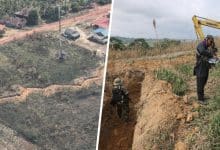Internal Security Agency stresses crucial role in addressing Deep South conflicts

The Internal Security Operations Command (ISOC) reaffirmed its critical function in resolving conflicts within the Deep South and upholding national security during a recent press conference led by Major General Winthai Suvaree, ISOC’s spokesperson. The discussion also addressed the Move Forward Party’s (MFP) proposal to dissolve ISOC and tackled prevalent misconceptions surrounding its responsibilities.
Maj. Gen. Winthai underscored the significant role of ISOC, a specialised government agency directly under the prime minister, dedicated to assessing threats that might compromise the kingdom’s stability. ISOC’s core focus is on fostering public awareness regarding the protection of the nation, religion, and monarchy while ensuring national harmony. Maj. Gen. Winthai clarified that ISOC’s duties are distinct and do not overlap with those of other security agencies.
Drawing attention to ISOC’s crucial involvement in handling unrest in the Deep South, encompassing provinces like Yala, Pattani, and Narathiwat, Maj. Gen. Winthai stressed that the absence of ISOC would weaken the government’s connectivity with diverse security agencies, significantly impacting the nation’s security.
Addressing speculations surrounding a purported secret seven-billion-baht (US$197,052,590) ISOC fund, Maj. Gen. Winthai dismissed these claims, asserting that ISOC’s expenditures are a part of the annual budget and follow standard protocols akin to those of other government agencies, reported Bangkok Post.
Gen. Nopphanan Chanpradab, former ISOC Office of Security Policy and Strategy Director, disclosed that a considerable portion of the budget allocated for ISOC’s operations in the Deep South was intended for officers stationed in ISOC Command Region 4. He assured that all spending is thoroughly audited, emphasising the agency’s commitment to transparency.
Gen. Nopphanan cautioned against the dissolution of ISOC, suggesting that such a move might worsen issues in the Deep South and impede security operations. He emphasised ISOC’s status as operating under a civilian-led National Security Council, highlighting the involvement of civilian figures, such as the prime minister, as commissioners.
Separately, political activist Somchai Srisutthiyakorn questioned the necessity of maintaining ISOC, expressing concerns about the agency’s substantial budget in contrast to its actual outcomes and raising issues regarding the high wages of ISOC officers.
Follow more of The Thaiger’s latest stories on our new Facebook page HERE.
Latest Thailand News
Follow The Thaiger on Google News:


























